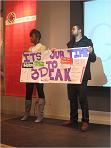A few months ago, after months of debate and negotiations, health insurance reform passed Congress: the biggest social reform in decades. Yet youth--who will be affected at least as much as anyone by the new bill--were barely aware that a national debate was even occurring.
(My co-authors of this piece, Scott Warren and Alison Cohen,* work with historically underrepresented youth in Providence, Boston, and New York through an organization called Generation Citizen that teaches democratic participation.)
The frenetic 24-hour news cycle means that young people hear more about Sarah Palin's latest Facebook message than substantive issues like health care, unemployment, the War in Afghanistan, and potential school budget cuts.
Meanwhile, teachers and students face the burden of increased standardized tests and measuring up to par, while our youth continue to fall behind in an increasingly competitive global marketplace. This is especially true in urban, low-income schools. Despite a range of attempted reforms, the academic achievement gap remains wide, and minorities and lower-income youth continue to fall behind.
Students from Charlestown High School in Boston, MA participate in Generation Citizen's Civics Day in December, 2009
Irresponsible political discourse and the academic achievement gap are linked to a problem that receives markedly less attention: "the civic engagement gap." There is evidence of widening disparities in civic knowledge, skills, and confidence between poor, minority and immigrant youth and adults, and middle-class or wealthy, white, and native-born youth and adults.
According to the Census, in the 2004 presidential election, people living in America's poorest families (incomes under $15,000) voted at barely half the rate of those living in America's wealthiest families (incomes over $75,000). Despite a 2008 presidential election that saw an expanded youth vote, the disparities continued: youth with some form of college experience were almost twice as likely to vote as those without college experience (62% to 36%). These gaps in political participation are linked to gaps in civic knowledge: African-American, Hispanic, and poor students perform significantly worse on the National Assessment of Educational Progress in Civics than white, Asian, and middle-class students.
The civic engagement gap has wide-ranging repercussions. Scholars have found that students who are more civically engaged tend to have higher levels of motivation and self-efficacy, and also perform better academically. When students address social problems, they recognize that their schoolwork is not only important for homework and standardized testing purposes; it allows them to be community leaders and take action on issues they care about. The academic achievement gap and civic engagement gap are inextricably intertwined.
The civic engagement gap also has obvious consequences in the political arena. Several studies demonstrate that politicians pay little to no attention to our poorest citizens. When issues like health insurance reform and unemployment are debated at the political level, those most affected by the issues rarely have their voices heard.
The reasons for this gap are complex; there is no simple solution. Effective, engaging civics education during the school day, however, is a strategy with promise. Mills College Professor Joseph Kahne and Ellen Middaugh have found that students from wealthier families are twice as likely as students of average socioeconomic status to report studying how laws are made or to participate in service activities, and one-and-a-half times more likely to do in-class debates. If we are serious about combating both the growing political inequality in this country, and lessening the academic achievement gap, effective civics education for every student in this country is a must.
First, schools must recognize that civics is an interdisciplinary subject and that it cannot be studied in a vacuum. In order to be effective citizens, students must be able to read, write and communicate effectively. It is completely possible, and necessary, to plan effective, engaging civics classes while aligning curricula to standards and preparing students for standardized tests.
Second, civics education must be engaging. Students learn math by practicing math problems; they learn science by conducting experiments. Students should not study civics by just learning the three branches of government: they should also engage in the political process by actually acting on issues of concern.
Effective and engaging civics education will not solve all of our political and educational problems. But closing the civic engagement gap is a necessary step to restoring the democratic political discourse that once defined this country, while simultaneously increasing student motivation and academic results. As school starts this fall, we must make a renewed effort to engage all of our youth in the political process. The next generation has the promise and potential to solve many of the problems plaguing American society, and it's our duty to help empower them with the skills they need to be active, effective citizens.
*Scott Warren is the Executive Director for Generation Citizen, and Alison Cohen is the Director of Evaluation and Research. Generation Citizen's mission is to expand democratic participation among youth populations that have been historically under-represented or actively excluded from the political process. Generation Citizen currently works with over 2,000 youth in Providence, Boston, and New York City
